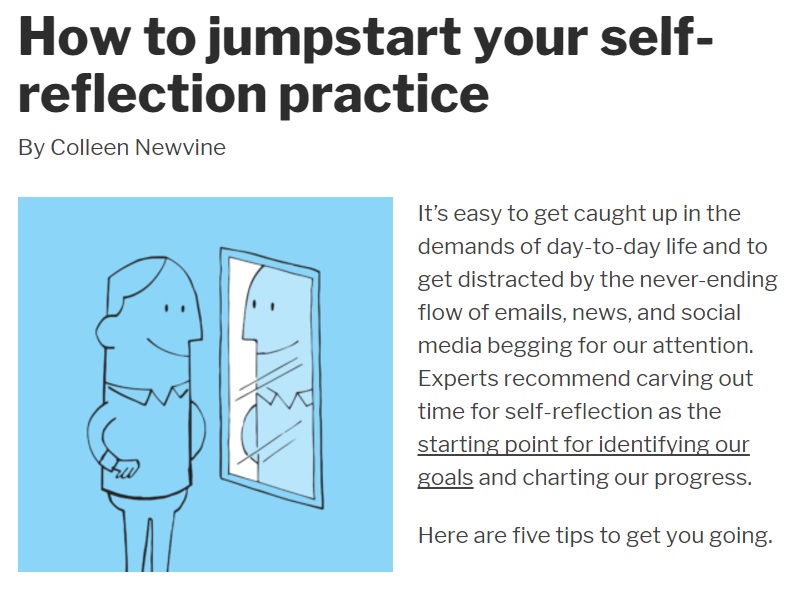“People don’t learn from experiences, they learn from the reflection on their experiences.”
That quote from Rosie Guagliardo, life and career coach with InnerBrilliance Coaching, is one of the many insights that’s stuck with me after I wrote a series of stories about self reflection for Unstuck.
Unstuck, as the name implies, is a website that offers help getting yourself unstuck, whether that’s from relationship difficulties, challenges at work or an overall sense that your life isn’t as satisfying as you’d like. This premise of this self reflection series is that you can’t get unstuck if you don’t spend time reflecting so you can notice that you’re stuck and consider how you got there.
I loved working on these stories because they gave me a different kind of opportunity to explore the kinds of themes I do here, including getting insights like these from experts:
- “It is possible to experience some type of success without self-reflection – however, if that success is meaningful to the person is a different story. Many times purpose is the best driving force to help people experience success, but without being in touch with yourself and reflecting on that, we default to what society deems as success,” said Craig Foust, a counselor and therapist.
- “Self-reflection is a positive space. It is an imperceptible forward movement,” said Amanda Enayati, who writes and consults on lowering stress. Enayati notes that our culture prizes constant motion and activity, so opting out requires discipline. “In order to move forward, you have to be in a space where it looks like nothing is happening.”
- “Reflecting on your core values — the things you care most about — is the first step to creating purpose,” said Vic Strecher, a professor at University of Michigan School of Public Health who studies life purpose. “Socrates said that the unexamined life isn’t worth living. Reflective examination of what matters most in your life is the first step.”
- “Self-reflection can include attending to subtle physical sensations that provide clues about feelings that haven’t quite entered consciousness. Just as a barometer picks up slight changes in pressure that can signal the arrival of a different weather system, a tight feeling in our stomach or an ache in our chest can indicate an emerging sense of unhappiness about something in our lives,” observes Lisa Marchiano, licensed clinical social worker and Jungian analyst.
My series of stories includes:
- An overview on why we need self reflection and why we avoid it, from being too busy to being afraid of what we might see
- Three personal stories of finding the value of self reflection
- Practical pointers for making self reflection a regular part of your life
- Hazards to avoid, including letting self reflection tip into self criticism or getting stuck in reflection mode instead of using it to inspire action

I’d love to hear how you find time for self reflection and how it’s helped you, as well as challenges you face with self reflection or questions you have.
Nobody said you have to do self reflection alone.

2 Comments
Leave a reply